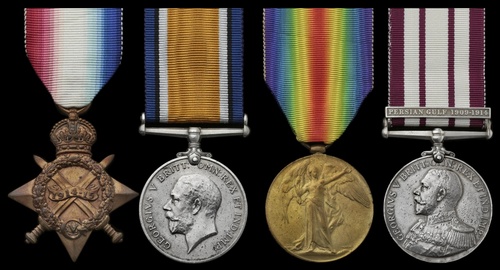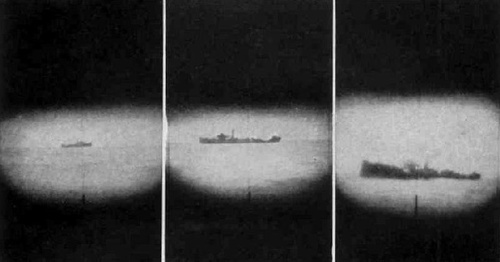Auction: 22003 - Orders, Decorations and Medals
Lot: 369
30 APRIL 1917: Q-SHIP ACTION
A Persian Gulf and Great War campaign group of four awarded to Leading Seaman J. C. Rowland, Royal Navy
A veteran of the Dardanelles, he went on to serve in Q-Ships and was present aboard the Tulip (a.k.a. Q-12) on the occasion of her loss to the U-61 in April 1917, an event captured in a remarkable series of periscope photographic images
Naval General Service 1909-62, 1 clasp, Persian Gulf 1909-1914 (J. 342 J. C. Rowlands, A.B., H.M.S. Swiftsure), note surname spelling; 1914-15 Star (J. 342 J. C. Rowland, A.B., R.N.); British War and Victory Medals (J. 342 J. C. Rowland, L.S., R.N.), contact marks, thus nearly very fine (4)
Joseph Charles Rowland was born at Camberwell, London in January 1892 and entered the Royal Navy as a Boy 2nd Class in January 1908. Joining the cruiser H.M.S. Swiftsure as an Able Seaman in March 1913, he witnessed active service in the Persian Gulf and, following the outbreak of hostilities in August 1914, served ashore in the Suez and Dardanelles operations of 1915-16.
Coming home to Pembroke in May 1916, Rowland next transferred to the clandestine world of Q-Ships. He served aboard Q-12 ('Tulip'), an Aubretia-class sloop, from August 1916 until her loss in the Atlantic on 30 April 1917, when she was torpedoed by the U. 62; remarkable photographs exist of Q-12 viewed through the German U-Boat's periscope, moments before the torpedo struck and of the immediate aftermath.
Carson Ritchie's Q-Ships takes up the story:
'On 30 April 1917, Tulip was steaming 200 miles west of Ireland when a periscope was sighted. The commander, Norman Lewis, turned towards the submarine, intending to ram, but before the ship could answer the helm a torpedo hit her amidships, killing many of the engine room staff and wrecking the largest lifeboat. Lewis gave the order to abandon ship and threw overboard the iron box containing the confidential books. His steward, a butler in civilian life, apologised for leaving the captain's cabin in such a terrible state as the survivors got away in the three remaining boats.
The U-boat, U. 62, commanded by Korvetten-Kapitan Hashagen, closed the life boats, and a young officer asked for the captain. Lewis raised his hand and was ordered aboard. He was taken to Hashagen who said: "Good afternoon, captain. Do you have any papers or weapons on you?" Lewis said that he did not. "Very well," said Hashagen, "sit down and have a drink." Lewis was expecting a rather different reception, but as he said later: "Being of a tactful nature, I had one." He continued to be treated well in the U-boat and spent the rest of the war as a prisoner at Freiburg. His men were left to a 200-mile row home: fortunately, they were picked up the following day.'
Rowland saw out the war with appointments in the cruisers Euryalus in the period July-October 1917 and in Sapphire from the latter month until the end of hostilities. He was finally pensioned ashore as a Leading Seaman in September 1922.
Subject to 20% VAT on Buyer’s Premium. For more information please view Terms and Conditions for Buyers.
Sold for
£320
Starting price
£250







